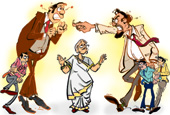 |
When the Ambani brothers were fighting tooth and nail, the one person who stopped the battle from getting even more acrimonious was their mother Kokilaben. Her role was so critical that, at a board meeting on June 8, 2005, the directors of Reliance Industries placed on record their gratitude for “her sincere and painstaking efforts… and finding an amicable resolution in the overall interests of the company and its shareholders”.
There is a new name for people like Kokilaben these days. According to a recent article in Knowledge@Wharton.com, the magazine of the Wharton business school, they are CEOs — chief emotional officers. It does not matter whether they are technically within a company or outside it. In family-run businesses, they are the glue that holds the organisation together.
The chief emotional officer is an informal function, says the article. It is often a woman. “Not only do they provide emotional support — smoothing things over and keeping communications open — but they also help acculturate in-laws, protect family traditions and values and make sure the family gets together to socialise and have fun,” says the article.
This is an important role, though it has not been formally recognised so far. It matters because some of the largest companies are family run. The world’s no. 1 corporation — Wal-Mart — belongs to this category (see box).
In India, if you leave out the public sector undertakings, almost all the top companies fall in this basket. Family Business magazine places the Tatas here too, though they would inevitably protest that they are a professional group. But there is nothing contradictory in that; you can be family-run and professional at the same time.
Big companies lose their family moorings over a period of time. But in terms of numbers lower down the ladder, they play a vital role. According to the Confederation of Indian Industry (CII), family businesses account for 60-70 per cent of the country’s GDP.
“As new generations join the family business, it is an enormous challenge to keep the family and business together,” says CII. “Some sacrifice the business to keep the families together while others sacrifice the family to keep the business. It has been observed that just 13 per cent of family businesses survive till the third generation and only four per cent go beyond the third generation. One-third of business families disintegrate because of generational conflict. However, the close-knit structure of families, which fosters teamwork combined with respect for family values and family elders, has been the key to the success of many family businesses.”
Call them family elders or chief emotional officers, their role needs to be recognised. But so must their limitations. In the Bajaj group, for instance, Rahul Bajaj has stepped out of all operational matters. But he clearly is the chief emotional officer. No one else can shine when he is around. Will the group survive without him?
When the emotional head is not part of the formal organisation — the patriarch’s wife, say — conflicts can arise among the family members who actually run the business. This is what often pits mother against son.
Finally, it is not possible to train a chief emotional officer. You can’t inherit the role. You need to be somewhat lucky to have such a person in your family.
Perhaps Indians are lucky. According to a recent survey of family business owners by Grant Thornton International in collaboration with the International Centre for Families in Business, internationally 31 per cent expect that the business will pass out of the family’s hands in the next 10 years. In India, the figure is much lower at 13 per cent. Perhaps that’s why we have such large families, business or otherwise.
TOP OF THE POPS
The biggest family businesses : company rank
Wal-Mart 1
Ford 2
Samsung 3
LG 4
Carrefour 5
Reliance 63
Tatas 71
AV Birla 87
Jumbo 199
Source: Family Business Magazine; 2004










